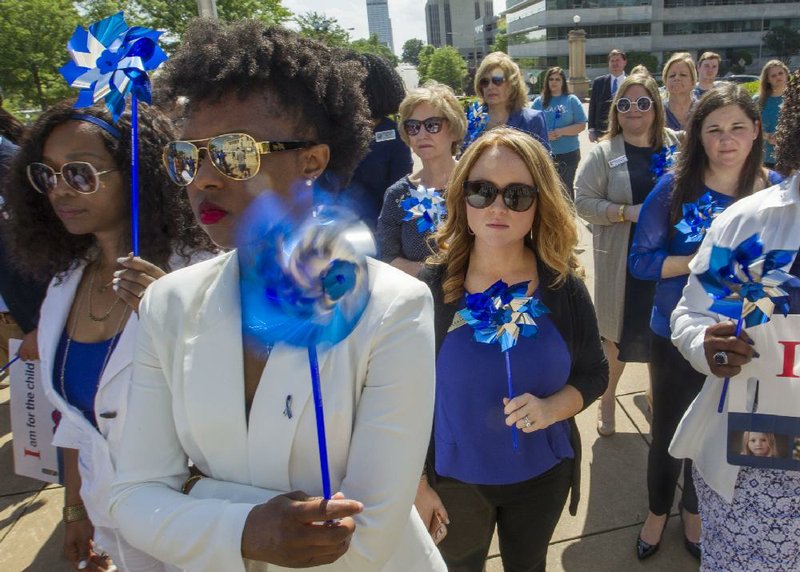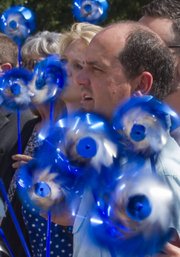Growth in the number of children in foster care has plateaued since hitting a record high last year, the director of the Division of Children and Family Services said Wednesday.
Mischa Martin, who took the reins of the Department of Human Services division a year ago, said increased staffing, partnerships, and pay raises for key employees will continue to improve the foster care situation.
The number of children in foster care first topped 5,000 in mid-2016. Officials referred to the growth as a crisis that was straining state resources. Gov. Asa Hutchinson has made addressing the problem a priority, asking the Legislature to authorize tens of millions of additional dollars for the division.
"We really focused on child placements for my first year," Martin told a reporter. "Moving into my second year, it's going to be all about prevention and strengthening the workforce."
Martin spoke to a reporter after a child-abuse prevention rally at the Capitol that was attended by lawmakers, state employees, nonprofit groups and first lady Susan Hutchinson, a longtime activist against child abuse.
State officials have long said unchecked growth in the number of foster children was unsustainable.
Martin said 5,172 children were in foster care as of Monday.
Quarterly reports show 5,129 children in foster care at the end of December and 5,178 at the end of September. That's the first quarterly decrease in two years.
"That's a huge sign," Martin said. "Since January 2015, we were increasing every month. It's now been about six months since we leveled off."
Last year, state officials told lawmakers that the average Arkansas caseworker juggled about 30 cases -- double the national average -- and quit the division after a year or two of work.
Cindy Gillespie, the human services director, had said the result was that state workers did not remove children from foster care -- through adoption, giving custody to relatives or returning them to their homes -- fast enough, which created a growing backlog.
Martin said more money has helped with additional hires and pay raises, which in turn are helping with caseloads and retention rates.
The plan is to hire 200 workers with a nearly $27 million budget increase approved by lawmakers. The budget, which goes into effect July 1, will be $118.2 million. One-time money, drawn from surplus funds, jump-started the process.
Many caseworkers now are paid a minimum of about $30,713 annually. That will increase to $36,155 on July 1.
After a child-abuse prevention rally last April, Martin told a reporter she wanted to work with nonprofit groups to open more homes for foster children.
Quarterly reports show the state and nonprofits like The Call recruited 240 new foster families in 2016, adding more than 400 beds. The state had been steadily losing foster homes until 2015.
At the rally this year, Martin introduced Rachel Hubbard, operations co-director at Second Chance Youth Ranch.
Hubbard told rally attendees that community members are needed to provide abused children with love and hope. Hubbard said abuse can persist in a family for generations if left unchecked.
"They don't have to repeat the mistakes that have been done to them. They don't have to be traumatized for their entire life," Hubbard said. "We can wrap around these children in foster care because they've been removed from atrocious situations and say, 'Hey, there's a better way.'"
During the rally, nonprofit leaders held puzzle pieces to signify their inclusion in the process. Others held blue pinwheels, a symbol used to highlight child-abuse prevention.
Susan Hutchinson noted that the vast majority of child abuse is perpetrated by people who know the victims well.
"We see those people in prison. We see those people on the street. We see them dysfunctional. We also see them in boardrooms. We see them in pulpits. We see them in classrooms. We just don't recognize them," she said.
"There are no horns growing out of their ears. I wish there were. We could recognize them. But they walk among us as wolves in sheep's clothing. We have to be aware of that. That's what makes it so difficult to be believed when they [children] share the nightmares."
Metro on 04/20/2017

